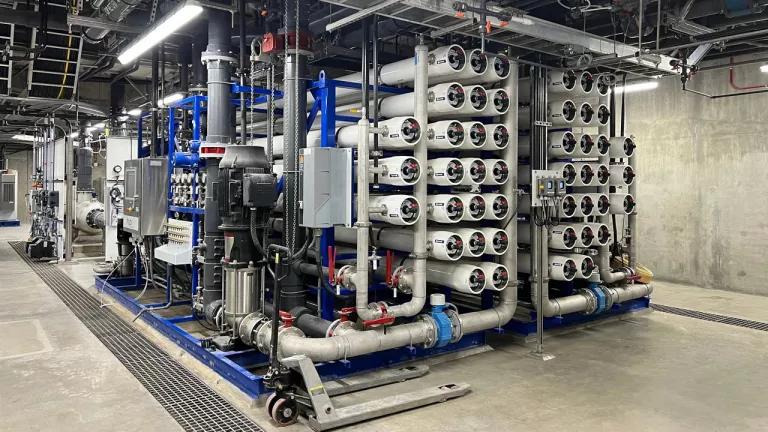Trump Budget vs. the Great Lakes

The Great Lakes are an indelible part of the quality of life in some of America’s greatest cities (Canada’s too!). But the Trump budget outlined this week clearly represents a threat to the region.
Between the elimination of the Great Lakes Restoration Initiative and the hobbling of the Environmental Protection Agency (not to mention a few bills bubbling in Congress), this region would see an influx in pollution and invasive species (living pollution) that would be devastating. The Great Lakes Restoration Initiative (GLRI) is an essential tool for cleaning up the largest surface fresh water resource in the Western hemisphere. It provides resources to:
- clean dangerous industrial contamination
- fix water infrastructure that prevents sewage from contaminating our beaches with...y’know…gross stuff
- install invasive species controls to keep the critters and plants that have already hobbled the ecosystem at bay and prevent new ones from entering and worsening an already ugly situation
- reduces the runoff of nutrients that fertilize the sorts of algal blooms that robbed Toledo and portions of Michigan of their drinking water in 2014 and essential monitoring of the Lakes’ water quality
The Trump budget eliminates ALL of that.
But wait, GLRI isn’t the only program getting the axe! Broader EPA cuts open the door to all sorts of added ugliness…and create a double whammy for the region. The Administration suggests that the work of GLRI and other regionally-focused programs is duplicative of work being done in other EPA programs and at other agencies, even as it slashes those “other” programs.
The Administration’s denial of climate change and the enormous threats it poses to our nation is manifest with a zeroing out of any project designed to understand and mitigate the damage (and not just in EPA’s budget—State Department, NOAA, Department of Interior and other climate-related programs in every other budget will be dropped). For the Great Lakes, climate change denial helps speed the elimination of species and duneland already underway in the region. This is crazy on so many levels.
Here in Chicago, EPA has taken action that has improved the lives of many in this city. They stepped in to force a reduction in pollution from BP’s massive tar sands refinery in Whiting, IN that would have dumped massive amounts of mercury into Lake Michigan and huge amounts of other pollutants into our air. They stepped in to help, finally, force an end to the regional water authority’s practice of dumping un-disinifected water, rife with human gut bacteria and all the disease that comes with it, into the Chicago River. They helped push back on oil refining waste being dumped near our neighbors’ back yards on the Southeast Side in 5-story piles. (I’ll note proudly, that we sued in all these cases, which may have prodded EPA to action—you can expect us to keep pushing in the courts.)
But the Trump budget takes a sharp swipe at the EPA’s office of enforcement—the essential role of environmental cop on the beat—with a 24% cut. The vast majority of the budget, 80%, goes to salaries, so this reduction means significant loss of staff and all of the resources that would go towards holding polluters accountable for dumping in our waterways, neighborhoods or airsheds. And while I am ticking off local examples, the impact will be the same in every city and region in the country, where existing problems will be allowed to fester and those who would create new ones will be emboldened.
As I look at the issues we are working on in the region now, this deficit of attention and enforcement is frightening. On the Southeast Side, open piles of manganese are exposing the community to breathing in a dangerous carcinogen. In East Chicago, Indiana, the community is facing lead in their water as well as their soil—we have petitioned the EPA to take emergency action to help in that case. We will see what Administrator Pruitt decides in what will really be the first test of his Agency’s resolve to protect Americans’ health and well-being. Congress is attempting to roll back rules to prevent freighters from dumping ballast water rife with invasive species into the Great Lakes. In each of these situations, the EPA has a role to protect Americans and our resources.
And while I am not confident EPA will continue to step in to help…I am confident that this budget won’t stand. The Great Lakes are one of the few bipartisan issues left in DC, where our elected representatives can work across the political aisle. This budget reflects a misunderstanding of the priorities of some of the most politically important states in the nation. People in Michigan—“The Great Lakes State”—did not vote to open Lake Huron to pollution. People in Ohio did not vote for more dangerous algae blooms in Lake Erie. Nobody voted for more toxic sites and sewage leaching into rivers and lakes. And their elected representatives know it. Politicians from both parties in this region have already begun to push back on this budget. And I think they will get louder when they hear from their constituents.
The question is, how hard will Congress push back and what will they force the feds to fund? People in this region are watching and will remember the answer…The ongoing pollution burden is already pretty hard to forget. If Congress is serious about defending the Great Lakes, they have to not just fund the work via the Great Lakes Restoration Initiative, but also the host of other programs that affect the Lakes—and more importantly, ensure there are resources to enforce the laws, too.




